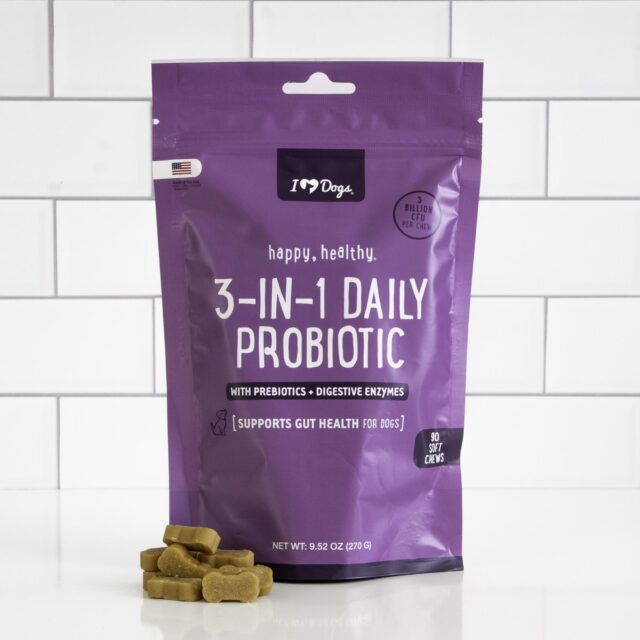Dogs can experience digestive discomfort for a variety of reasons, from food sensitivities to temporary stomach upsets. Since they can’t tell us when they’re feeling unwell, pet parents must rely on changes in behavior, appetite, or stool consistency to recognize when something is off. While occasional digestive issues are normal, frequent tummy troubles may signal a need for additional digestive support.
Bromelain, a natural enzyme found in pineapples, has been shown to aid digestion by helping the body break down proteins more efficiently. In addition to promoting better digestion, bromelain also has anti-inflammatory properties that can support overall gut health and improve nutrient absorption. When used appropriately, it may help ease digestive discomfort and contribute to better overall well-being for your dog.
If your pup experiences occasional digestive upset, learning how bromelain works may help you determine whether it’s a good addition to their diet.

What is Bromelain?
Bromelain is an enzyme that comes from pineapples, specifically the juice and stems. It was first separated from the fruit in 1891 during a fermentation process. In history, pineapples were most commonly used for medicinal purposes by South and Central American natives.
Humans primarily take bromelain to benefit from its anti-inflammatory properties. It can be used orally to reduce swelling or topically to aid damaged skin. Yet, it can also have added benefits, such as improvements to the digestive tract and immune system.
Humans aren’t the only ones who benefit from bromelain. It’s also commonly used in canine supplements to boost your dog’s health in several ways.
Related: Best Digestive Enzyme Supplements for Dogs
Is Bromelain Safe for Dogs?
Yes, bromelain is safe for dogs when dosed correctly. It’s a natural remedy with very few side effects, and studies show that it has no risk of toxicity for canines. It can be used by itself or given with other enzymes or medications.
However, bromelain can have side effects like any other supplement, so talk to your vet about whether or not it’s suitable for your dog before serving it. While most dogs experience benefits from it, the results can vary for individual canines.

Can Dogs Eat Pineapples?
Yes, dogs can also eat pineapples. They should only eat the flesh, not the core or exterior. Most fruits are safe for dogs to eat, and many of them provide health benefits too.
Small amounts of raw pineapple can provide vitamins and antioxidants to your dog. Pineapple also contains a lot of water, so it’s a good snack for hydration on a hot summer day. However, you should avoid canned pineapples because canned fruits usually have too much sugar for dogs to handle.
Dogs can get bromelain simply by eating pineapple, but it won’t give them enough to reap significant benefits. Giving them too much pineapple could increase their sugar intake too much. So, serve them a canine supplement containing bromelain instead.
What Does Bromelain Do for Dogs?
Bromelain can benefit your dog in so many ways. So, if you’re using it for one specific aspect, you may get some added benefits. Here are four ways bromelain can make your dog feel its best.
Improves Digestion
There are lots of reasons a dog could experience digestive problems, including allergies, food sensitivities, behavior issues, or medical needs. Regardless of what’s bothering your dog’s stomach, bromelain can regulate their digestion to reduce the amount of tummy troubles. This ingredient may also improve the absorption of nutrients in your dog’s body, helping their overall health.
Bromelain is a proteolytic enzyme that can break down protein in the body. Yet, many enzymes get destroyed by digestive juices, so your dog will need to eat a lot of it to notice significant digestion improvements. Most canine supplements contain the ideal amount for your pup’s consumption.
Related: Best Dog Breath Fresheners

Strengthens the Immune System
Bromelain is a natural pineapple enzyme that can increase the number of minerals in a dog’s body, such as zinc. Zinc can keep your dog’s immune system strong even as they age. Most dogs experience a weakened immune system in their senior years, just like humans do. So, taking a bromelain supplement could make your dog less likely to get sick.
Reduces Pain and Swelling
When your dog experiences some type of pain or injury, its body often produces fibrin and kinins. Fibrin is a protein that’s produced to cause blood clotting when the body bleeds. Then, kinins are chemical compounds that also control blood-related activity. Together, these items contribute to swelling and pain when your dog gets hurt.
When bromelain is consumed, it removes fibrin and kinins. Thus, it can reduce the swelling your dog experiences after an injury or due to arthritis. It works as a natural pain reliever that can be safer than some prescribed medications. It can relieve pain related to wounds, sprains, bruising, muscle damage, and stiffness.
However, you should ensure that your dog’s swelling isn’t related to an underlying condition before relying solely on bromelain. If the swelling gets worse at any point, contact your vet.

Provides Allergy Relief
Bromelain is also considered an antihistamine, which is an allergy relief agent. So, it can help control the symptoms of allergic reactions, such as seasonal allergies and bug bites. An oral supplement can heal skin irritation caused by allergies, but a topical version of bromelain for dogs may be available.
If your dog has allergies to pineapples or similar fruits, bromelain could do the opposite. Avoid this ingredient if you suspect your dog may be sensitive to it.
How Much Bromelain is Safe for Dogs?
There is no exact dosage for all dogs. The bromelain dosage for dogs varies based on your furry friend’s needs and the product you choose. For the safest dosage, talk to your vet. They can confirm the product’s suggested dose or adjust it based on your dog’s age, weight, and medical history.
If you give your dog a chewable supplement, the container will likely tell you to provide them with one to three tablets/chews per dose. If you use a liquid supplement, the dosage will be between 5 and 15 mg per pound of body weight. The supplements are most effective for digestive purposes if they’re given 45 minutes to an hour before your dog’s next meal.
It’s safest to start with a slightly smaller dose than the recommended dose. Then, you can gradually begin giving your dog the ideal amount. That way, you can keep an eye out for any side effects and catch them early on. Most canine supplements have minimal risks, but it can’t hurt to be cautious.
Related: Best Calming Supplements for Dogs
Bromelain Side Effects
Most side effects associated with bromelain are minor and only occur if the dose is too high. High doses of bromelain could do the opposite of the benefits by causing digestive problems and cardiovascular concerns. That’s why confirming the dosage with a vet is crucial before giving it to your dog.

Here are some potential side effects of bromelain for dogs:
- Diarrhea
- Vomiting
- Nausea
- Increased heart rate
- Thinned blood
- Mucous membrane irritation
If any of the above concerns occur while your dog is taking a bromelain supplement, stop giving it to your dog immediately. Even if your dog’s reactions seem minor, they could escalate quickly. Explain the symptoms to your vet so they can suggest a more suitable supplement for your furry friend.
Bromelain supplements for humans have similar effects as dog supplements, but it’s best to only give your pup canine-specific products. Human supplements may contain additives that aren’t safe for dogs, so it’s best to avoid them altogether.
Related: The Best Heart Supplements for Dogs
Are There Any Drug Interactions?
Some medications can interact with bromelain, causing it to be less effective. Blood thinners, antibiotics, and some cancer medications may not be safe to take with this ingredient.
Before you give bromelain to your dog, tell your vet about all the medications and supplements your dog is currently taking. They can help you determine if it’s safe to add bromelain to your pup’s diet or not.

Related: Best Eye Supplements for Dogs
How to Serve Bromelain to Dogs
Enzyme supplements don’t usually need a prescription, so you can find bromelain supplements online or at the pet store. Most bromelain products include other ingredients, so not every supplement will be made for the same purposes. They could be advertised for allergies, immune support, or digestion. So, decide what your dog needs most when choosing a supplement.
Bromelain supplements can come in various forms, including pills, powder, liquid, or chewables. Powder and liquid options will be easiest to mix with your dog’s food, but picky eaters might turn up their noses to those. Pills and tablets are harder to hide in the food, but your dog might be more interested if you hide them in peanut butter or a pill pocket.
Chewable supplements are the most popular because they’re the easiest to serve. They’re usually soft with a scent that’s appealing to dogs. So, most dogs will think it’s a treat instead of something healthy.
When choosing any product for your pup, it’s essential to buy from a company you trust. So, to ensure that you’re purchasing a high-quality supplement, you should look closely at the ingredient list. If the supplement contains anything that you don’t feel comfortable serving to your dog, it’s okay to look for a safer alternative.
A Tasty Health Boost!
The iHeartDogs 3-in-1 Probiotic Chews are a tasty bromelain supplement for dogs struggling with digestive problems. They’re packed with probiotics, prebiotics, and enzymes. These chews are designed to promote healthy digestion, reduce stomach pains, and boost the immune system. Bromelain is part of the product’s enzyme blend, but there are plenty of other beneficial ingredients, too.
These chews contain an enzyme blend and probiotic complex, along with pumpkin, papaya, and dried bacillus coagulans. Together, these ingredients will give your dog the nutrients they need to have a healthy digestive system. Plus, every bag sold provides 12 healthy meals to dogs in need. So, you’ll be saving shelter dogs while also benefitting your own dog’s health.
Supporting Your Dog’s Digestive Health Naturally
Digestive health plays a key role in your dog’s overall well-being, and natural enzymes like bromelain may help promote better digestion and reduce discomfort. Whether your dog experiences occasional tummy troubles or has difficulty digesting certain foods, this enzyme could provide the support they need.
Before introducing bromelain or any new supplement to your dog’s routine, consult with your veterinarian to ensure it’s the right choice for their needs. With the right digestive support, your pup can enjoy a healthier, happier life with fewer tummy troubles.
- Best Joint Supplement for Dogs
- Best CBD Gummies for Dogs
- Goat's Milk for Dogs
- Skin & Coat Supplements for Dogs
- Weight Gain Supplements for Dogs
- Muscle Building Supplements for Dogs
- Heart Supplements for Dogs
- Multivitamins for Dogs
- Pill Pockets for Dogs
- Digestive Enzymes for Dogs
- Turmeric for Dogs
- Liver Supplements for Dogs
- Tear Stain Supplement for Dogs
- Breath Fresheners for Dogs
- Kidney, Urinary, & Bladder Supplements for Dogs
- Stool Eating Deterrent for Dogs
- Eye Supplements for Dogs
- Melatonin for Dogs
- Apple Cider Vinegar for Dogs
- Green Lipped Mussels for Dogs
- L Theanine for Dogs
- Chondroitin Supplements for Dogs
- MSM for Dogs
- Valerian Root for Dogs
- Chamomile for Dogs
- Boswellia for Dogs
- L Tryptophan for Dogs
- Yucca for Dogs
- Licorice Root for Dogs
- Bromelain for Dogs
- Papain for Dogs
- Devil's Claw for Dogs
- Quercetin for Dogs
- Hemp gummy for dogs
- Best Hemp Dog Treats
- Best Hemp Oil for Dogs
- Best Calming Treats, Chews, & Supplements for Dogs
- Best Bone Broth for Dogs
- Best Fish Oil for Dogs
- Best Probiotics for Dogs
- Best Hip Dysplasia Supplements for Dogs
- Best Colostrum for Dogs
- Best Quercetin for Dogs
- Best Greens for Dogs Supplements
- Best Vitamin C Supplements for Dogs
- Best Probiotic for Dog with Allergies
- Best Taurine Supplements for Dogs
- Best Dog Food Toppers
- Best Anal Gland Supplement for Dogs
- Best Dog Probiotic Powder
- Best CoQ10 Supplement for Dogs
- Best Liquid Glucosamine for Dogs
- Best Wrinkle Creams, Balms, and Wipes for Dogs
- Best Puppy Calming Treats
- Best Colloidal Silver for Dogs
- Best Adaptogen Supplements for Dogs
- Best Cognitive Supplements for Dogs
- Best Bee Pollen for Dogs
- Best Vitamin A Supplements for Dogs
- Best Vitamin E Supplements for
- Best Liquid Glucosamine Supplements for Dogs
- Best SAM-e Supplements for Dogs
- Best Hyaluronic Acid Supplements for Dogs
- Best Apple Cider Vinegar Supplements for Dogs
- Best Diarrhea Medicine for Dogs
- Best Milk Thistle for Dogs
- Best Turkey Tail Mushroom Supplements for Dogs
- Best Astaxanthin Supplements for Dogs
- Best Lutein Supplements for Dogs
- Best Electrolyte Supplements for Dogs
- Best Coconut Oil for Dogs
- Best Prenatal Vitamins for Dogs
- Best Puppy Milk Replacements
- Best Iron Supplements for Dogs
- Best Dewormer Products for Dogs
- Best Mange Medications for Dogs
- Best Cough Relief Products for Dogs
- Best Sinus Relief Products for Dogs
- Best Collapsed Trachea Supplements for Dogs
- Best Fireworks Anxiety Relief Products for Dogs
- Best Thunderstorm Anxiety Relief Products for Dogs
- Best Travel Anxiety Relief Product for Dogs
- Best Supplements for a Dog with a Torn ACL
- Best Supplements for a Dog with Patellar Luxation
- Best Supplements for a Dog with Intervertebral Disc Disease
- Best Zinc Supplements for Dogs
- Best Biotin Supplements for Dogs
- Best Tart Cherry Supplements for Dogs
- Best Resveratrol Supplements for Dogs
- Best Ginkgo Biloba Supplements for Dogs
- Best Ashwagandha Supplements for Dogs
- Best Supplements for Dogs with Cushing's Disease
- Best Adrenal Supplements for Dogs
- Best NAD+ Supplements for Dogs
- Best NMN Supplements for Dogs
- Best Supplements for Dogs with Dementia
- Best Supplements for Dogs with CCD(Canine Cognitive Dysfunction)
- Best Fiber Supplements for Dogs
- Best Spirulina for Dogs
- Best Hairball Remedies for Dogs
- Best Eye Drops for Dogs with Allergies
- Best Magnesium Supplements for Dogs
- Best Brushes for Double-Coated Dogs
- Best Dandelion Root Supplements for Dogs
- Best Probiotic for Dogs with Yeast Infections
- Best Flaxseed Oil for Dogs
- Best Chamomile Supplements for Dogs
- Best Lavender Supplements. Treats & Sprays for Dogs
- Best Collagen Supplements for Dogs
- Best Kelp Supplements for Dogs
- Best Activated Charcoal for Dogs
- Best Slippery Elm Supplements for Dogs
- Best Supplements for Dogs with Seizures & Epilepsy
- Best Antioxidant Supplements for Dogs
- Best Ubiquinol Supplements for Dogs
- Best Hormone & Glandular Supplements for Dogs
- Best Thyroid Supplements for Dogs
- Best Iodine Supplements for Dogs
- Best Dog Shedding Supplements for Dogs
- Best Detox Supplements for Dogs
- Best Postbiotics for Dogs
- Best Aspirin Products for Dogs
- Best Dog Anti-Nausea Products
- Best Dog Mouthwashes
- Best Camelina Oils for Dogs
- Best Hemp Seed Oils for Dogs
- Best Natural Anti-Inflammatories for Dogs
- Best Cancer Supplements for Dogs
- Best Sardine & Anchovy Oils for Dogs
- Best Fatty Acid Supplements for Dogs
- Best Chia Seed Supplements & Treats for Dogs
- Best Olive Oils for Dogs
- Best Amino Acid Supplements for Dogs
- Best Moringa Supplements for Dogs
- Best Echinacea Supplements for Dogs
- Best Cranberry Supplements for Dogs
- Best D-Mannose Supplements for Dogs
- Best Nettle Leaf Supplements for Dogs
- Best Marshmallow Root Supplements for Dogs
- Best Astragalus Supplements for Dogs
- Best Pumpkin Seed Supplement for Dogs
- Best Supplements for a Dog Wetting The Bed
- Best Blueberry Supplement for Dogs
- Best Bromelain Supplements for Dogs
- Best Yucca Supplements for Dogs
- Best Ginger Supplements for Dogs
- Best Rosehip Supplements for Dogs
- Best Allergy Medicines for Dogs
- Best Reishi Mushroom Supplement for Dogs
- Best Maitake Mushroom Supplement for Dogs
- Best Chaga Mushroom Supplement for Dogs
- Best Shiitake Mushroom Supplement for Dogs
- Best Cordyceps Mushroom Supplement for Dogs
- Best Lion's Maine Supplement for Dogs
- Have question? - Ask in our Dog Health Forum

 Toledo, United States.
Toledo, United States.
